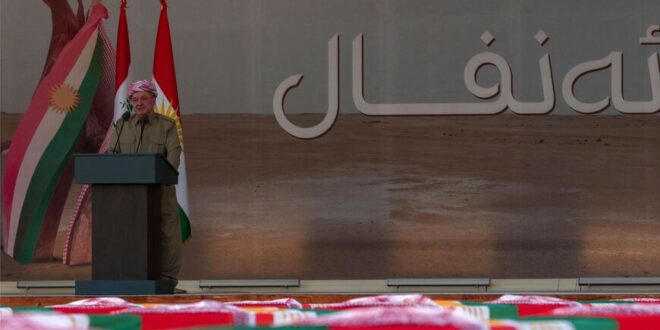In his memoir, Iraqi Kurdish leader Masoud Barzani shares that Turkey’s former President Turgut Ozal had once floated the idea of “annexing” Iraqi Kurdistan.
As Turkey escalates its campaign against Kurdish militants in the north of Syria and Iraq and Kurdish politicians within its borders, Masoud Barzani, the preeminent leader of Iraq’s Kurds, recalls a time when Ankara’s policy toward his people was distinctly different.
In the fifth volume of his memoirs published on Aug. 16 and titled “Barzani and the Kurdish Freedom Movement,” Barzani describes how Turgut Ozal, the iconoclastic liberal who governed Turkey first as prime minister and then president from 1983 until his sudden death in 1993, floated the idea of “annexing” Iraqi Kurdistan and the oil-rich province of Kirkuk as well as Mosul, which had been “unjustly” taken from Turkey and made part of Iraq by the League of Nations in 1924. It’s the first time Barzani has publicly shared this information.
Barzani says he was “puzzled” by Ozal’s frankness and decided to raise the matter with the Americans. The Americans said they would get back to him on “this great subject that is worthy of further research” but then never did.
The conversation between Barzani and Ozal took place after the first Persian Gulf War. The United States had kicked the late Iraqi dictator Saddam Hussain out of Kuwait and declared no-fly zones over the Shiite-majority south and the Kurdish-majority north of Iraq while crippling Baghdad with sanctions. US jets shielding the Kurds and the Shiites from further attack would fly out of the Incirlik airbase in southern Turkey. The first seeds of the American- and Turkish-midwifed Kurdish statelet in Iraq were thus sown.
Today, with thousands of Turkish forces deployed across northern Iraq and Turkish spies sprouting from every corner, a growing number of Iraqis, including their leaders, believe that Turkey’s President Recep Tayyip Erdogan harbors similar ambitions. That’s unlikely.
#THREAD: KDP Leader Masoud Barzani says in the latest edition of his memoir that Turkish former president Turgut Ozal had asked him and PUK leader Jalal Talabani in the early nineties to annex Southern Kurdistan (Erbil, Sulaimani, Duhok, Kirkuk and part of Nineveh) to Turkey. 1/3 pic.twitter.com/1MoRextjOT
— Karwan Faidhi Dri (@KarwanFaidhiDri) August 23, 2022As racist sentiments toward an estimated 5 million Syrian and other refugees soar, adding more Kurds and Arabs to the population would hardly be a vote winner. In any case, Ozal’s musings were not driven by hostility to the Kurds. On the contrary, says Cengiz Candar, a leading Turkish analyst on the Middle East and an Al-Monitor contributor, who served as Ozal’s adviser from 1990 until his demise. When it came to the Kurds, Ozal was the most forward-leaning Turkish leader in the country’s modern history, one who played a critical role in helping get Iraq’s Kurds to where they are today.
It was Candar who introduced Ozal to Barzani, and his rival Jalal Talabani, the charismatic Kurdish leader who went on to become post-Saddam Iraq’s first president.
Candar says Ozal had urged President George Herbert Walker Bush to overthrow Hussein, pledging full Turkish military support for the proposed campaign. Ozal had been deeply traumatized by Saddam’s use of chemical nerve agents against the Kurds in Halabja in 1988. He aired his revulsion to the Iraqi leader in a face-to-face meeting. “He viewed Saddam as a menace to the region and wanted him gone,” Candar said.
Candar noted that Ozal had expected Saddam to fall far sooner. In the chaos that would likely ensue and with Iran swooping in, Ozal believed that Turkey’s natural partners in the region were the mainly Sunni Kurds.
As such, incorporating the Kurdish-majority areas — and possibly Mosul and Kirkuk — were ideas that Ozal toyed with, though he told Candar he regarded oil as a curse that held back nations from democratizing.
The Turkish Foreign Ministry and the country’s generals who then held sway were horrified. Turkey’s chief of general staff resigned in protest. It didn’t help that Ozal believed that Turkey should switch from a tightly centralized system to a loose federal one under which the country’s own Kurds would enjoy some form of cultural and political autonomy. Candar says that Ozal was also unshakably pro-Western, which is why he applied to the European Union for full membership back in 1987.
For a while, it seemed that Erdogan, with his blitz of democratic reforms tailored to secure EU membership, including the first ever direct peace talks with the Kurdistan Workers Party (PKK), had embraced Ozal’s vision. Today, Erdogan is indistinguishable from the Turkish generals that he determinedly defanged.
Turkey’s close alliance with the Kurdistan Regional Government remains intact, cemented by a pipeline that since 2014 has carried Iraqi Kurdish crude to export terminals on Turkey’s Mediterranean shore. However, its unremitting military campaign against the PKK with an ever rising toll of civilian lives is putting Iraqi Kurdish leaders increasingly at odds with their own people. Though few dare say so, and it’s plainly exaggerated, to many, Erdogan is starting to look more like Saddam.
 Eurasia Press & News
Eurasia Press & News




